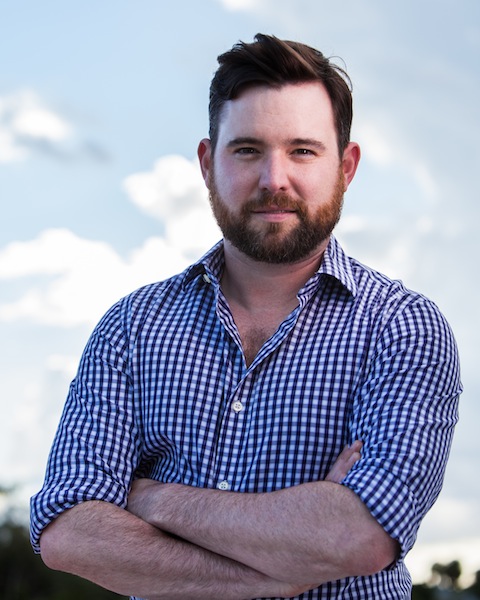Quigley premiere highlights Seraphic Fire’s 15th season opener

Patrick Quigley conducted the world premiere of his own “Three Ostinati for Voices” at the season-opening concert of Seraphic Fire Wednesday night in Miami.
“The Genius of Philip Glass” was the official title of Seraphic Fire’s opening concert of the season on Wednesday night. But the world premiere of Three Ostinati for Voices by artistic director Patrick Dupré Quigley was the big event of the evening. And appropriately so.
This season marks the chamber choir’s 15th anniversary. Quigley founded Seraphic Fire in 2001 as a church choir. Eventually it became a professional concert ensemble, presenting performances in venues across South Florida. Grammy-nominated recordings and tour performances have brought acclaim to the organization beyond the confines of Miami.
Quigley has combined artistic vision with the skill and musical integrity to make his dream a reality. He is a first-rate choral conductor who has brought South Florida audiences a wide variety of often rarefied repertoire. But who knew that he is also a highly gifted composer?
The sonorous acoustic and domed majesty of St. Sophia Greek Orthodox Cathedral in Miami was a fine showcase for Quigley’s score. Throughout the three-movement work, spanning about ten minutes, Quigley manages to vary the ostinato’s repeated notes and motifs with skill and imagination. In the opening section (“Music, where soft voices die”), one note is repeated in every chord by the female voices with a simple melody superimposed over the repetitions. In his more rhythmic setting of “Regina coeli” one figure is softly chanted while another is given full-voiced treatment, with strikingly original treatment in the closing Alleluia. Repetitive harmonic progressions mark the final section, “There will be rest.” An inspired melody rises in the female voices in this gleaming final section.
It was obvious that Quigley had the sound of his choir in mind when creating this score which is dedicated to Joanne Schulte, the organist, pedagogue and arts patron who cofounded Seraphic Fire with Quigley.
With an initial score of such quality, one can only hope that he will continue to create more new music for his group. The ensemble rewarded him with a beautifully vocalized debut performance, with the composer-conductor displaying his skill in balancing and dynamics. The audience gave Quigley’s music prolonged cheers and applause.
The evening’s other premiere was Four Levertov Settings by Christopher Theofanidis. Theofanidis is a leading contemporary composer and has taught at numerous American conservatories. Based on poems by British-born writer Denise Levertov, the 20-minute work runs the gamut from bouncy to angular and austere.
In “Unaccompanied,” a solo violinist plays Bach fragments while heavy choral textures are piled over the instrumental line. Serene vocal writing is interrupted by more astringent violin interjections in “Bruckner,” a poem Lederov wrote after attending a concert. The purity and flawless range of Sarah Moyer’s high soprano brought the narrative of “One December Night” to vivid life. Here the combination of the violin’s harmonics blending with the solo soprano produces a dreamy aura.
Theofanidis’s cycle is a fine addition to the choral repertoire. Quigley and the singers were on top of all of the tricky changes of rhythms and dynamics. Matthew Albert, a contemporary music specialist and founding member of the ensemble eighth blackbird, was the agile violin soloist. His technical command and skill at blending with solo and ensemble singing was impressive.
The concert opened with a soaring rendition of “America the Beautiful.” Four vignettes by American composers demonstrated anew the choir’s strengths. Beautifully blended timbres graced Steven Sametz’s “I have had singing.” The singers brought finesse to the widely spaced vocal pyrotechnics mixed with folksy lyricism of Irving Fine’s “Have you seen the white lily grow?” Peter Klatzow’s “Cover me with the night” emerged grave and solemn.
The five “Knee Plays” from Philip Glass’s opera Einstein on the Beach concluded the concert. These are intermezzos between the scenes of Glass’s five-hour epic.
This score comes from the early days of Glass’s minimalism. It is highly experimental and, compared to the composer’s later, more sophisticated works, somewhat primitive. Organ and violin are skillfully balanced with the voices. Glass’s setting of the chorus counting numbers is diverting until the umpteenth repetition. Some of the fast sections sound like Carmina Burana on steroids.
Still there are haunting moments along the way and Quigley’s superb leadership gave the music much-needed contrast and verve. Albert’s virtuosic fiddling and Hilda Oramas’ dexterity at the organ aided in making the best case for these choral cameos.
Seraphic Fire repeats the program 7:30 p.m. Friday at St. Philip’s Episcopal Church in Coral Gables, 7:30 p.m. Saturday at All Saints Episcopal Church in Ft. Lauderdale, and 4 p.m. Sunday at All Souls Episcopal Church in Miami Beach. seraphicfire.org
Posted in Performances
2 Responses to “Quigley premiere highlights Seraphic Fire’s 15th season opener”
Leave a Comment
Thu Oct 20, 2016
at 12:48 pm
2 Comments







Posted Oct 23, 2016 at 7:45 am by Karin Strasswimmer
We drove to see your fantastic performance in Ft. Lauderdale! Beautiful! We are looking forward to your performance at the Kravis.
Thank you!!
Posted Nov 07, 2016 at 7:50 pm by Patricia Terrell
Would love to have a recording of this concert.